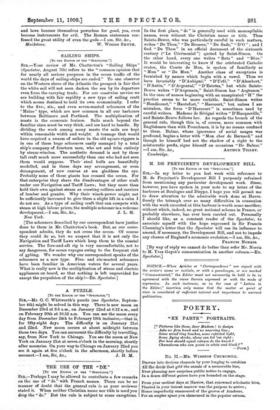THE USE OF THE "DE."
[TO THE EDITOR OP THE " SPECTATOR."]
SIR,—Perhaps I may be allowed to contribute a few remarks on the use of " de " with French names. There can be no manner of doubt that the general rule is as your reviewer stated it. When neither Christian name nor title is used you drop the " de." ' But the 'rule is subject to some exceptions. In the first place, " de " is generally used with monosyllabic names, even without the Christian name or title. Thus Sainte-Beuve, who was particularly careful in such matters, writes " De Thou," " De Brosses," " De Sade," " D'O " ; and I find "De Thou" in an official document of the sixteenth century (" Le Ceremonial ") quoted by Saint-Simon. On the other hand, every one writes " Retz " and " Beze." It would be interesting to know if the celebrated Catholic orator, the Comte de Mun, is spoken of familiarly as "Mun " or "De Mun." Another class of exceptions is furnished by names which begin with a vowel. Thus we have invariably "D'Aubigne," D'Urfe," "D'Alembert," " D'Antin," " D'Argental," "D'Estreles,"- but while Sainte- Beuve writes " D'Argenson," Saint-Simon has " Argenson." In the case of names beginning with an unaspirated "H" the practice seems to be more variable.. Saint-Simon writes " Hendicourt," " Hautefort," " Harcourt," but. unless I am mistaken, the form " D'Harcourt " is sometimes used by careful writers. Madame de Sevigne writes " D'Hacqueville," and Sainte-Beuve follows her. As regards the breach of the general rule, though this is, of course, more common with Englishmen than with Frenchmen, it is by no means confined to them. Balzac, whose ignorance of social usages was profound, begins a letter with "Mon ober de Bernard," and though be himself had not the shadow of a right to the aristocratic prefix, signs himself on occasions " De Balzac."






































 Previous page
Previous page